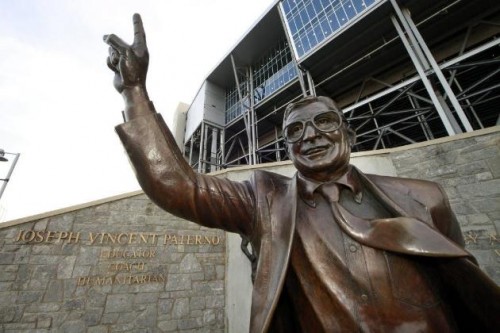
NCAA president Mark Emmert’s move to quickly sanction Penn State is logical, but shouldn’t set a precedent
The NCAA’s often-rigid procedures and policies exist for a reason. While many of their rules are perhaps unnecessarily bureaucratic and problematic, at least those rules apply equally to all member institutions (at least in theory). However, NCAA president Mark Emmert is stepping way outside the usual system by personally handing down sanctions Monday against Penn State over the school and the football program’s alleged cover-up of Jerry Sandusky’s sexual abuse of children.
Emmert’s stand is an unusual one here, as sanctions tend to come from the NCAA’s enforcement arm rather than its president, and only typically after a lengthy internal investigation. While this move may be radical and laudable in this particular instance, though, it shouldn’t signify a shift to a new way of handling NCAA infractions.
The slow, bureaucratic process that’s typically used in NCAA infraction cases certainly has its issues, but it comes from a commendable ideal: fairness. The concept itself is a crucial underpinning of sports leagues; rules have to be clearly set out and apply to everyone for leagues to maintain credibility, and even a whiff of skepticism about a league favoring one side over another can be extremely problematic. That’s even more the case in the realm of discipline.
Granted, the penalties the NCAA hands out for violations tend to be wildly inconsistent as it is (compare the cases of USC and Ohio State, for example), but at least a similar process following similar rules was followed in each case. While USC was hit far harder than the Buckeyes, it’s much easier to chalk that up to some of the differences in the cases (for example, USC’s stretched across sports) than any institutional bias toward one school. The peril of an action like Emmert’s is that if used as a precedent, it could create a troubling environment where the NCAA doesn’t do its own investigations, doesn’t hand out penalties via the established enforcement arms and just distributes whatever looks about right quickly before all the facts come out.
[php snippet=1]
We’ve seen the problems having a one-man disciplinary committee has caused in the NFL thanks to commissioner Roger Goodell’s centralization of the league’s punishment powers in his own person. If Emmert’s action is the new way the NCAA plans to do business, similar issues could crop up in the college ranks. That’s a troubling thought, as this is where the accusations of bias and unfairness start to fly. If decisions are handed out by a committee after a long, regulated process, there can be plenty of quibbling with each individual decision, but it’s much harder to question the whole system. With one man handing out the punishsment, his motives and personal history become part of the story and even the perception of inequity is enough to cause serious problems for a sports league.
Despite all that, there’s a strong case to be made that Emmert is doing the right thing in this particular instance. For one thing, the Sandusky case and the alleged cover-up far transcend any of the other college sports scandals we’ve seen recently. This isn’t just about key school officials breaking NCAA rules, but about them breaking federal laws, and former athletic director Tim Curley and former vice-president Gary Schultz are facing charges of perjury and failing to report child abuse.
That’s a long way beyond a typical NCAA enforcement investigation over illegal benefits.
Also, much of the NCAA’s investigative work has already essentially been done for them; the independent, Penn State-commissioned report by former FBI head Louis J. Freeh includes a shocking range of details and corroborative evidence of a university-wide coverup, and it’s tough to imagine NCAA investigators finding much more.
Moreover, thanks to the severity of this situation and the amount of investigative work already done, there’s an argument to be made that this demands a swifter response from the governing body than is typical of the NCAA. If the organization took the typical year or more to duplicate Freeh’s work with their own investigators before deciding on penalties in a committee, they would be killed in the press for doing nothing. “What will the NCAA do?” would be the key story around every Penn State football game, and the organization would be under siege from the public until they delivered a response.
Popular reaction shouldn’t dictate penalties, but it has a role to play in determining the timeline involved; as long as the end result is fair and approved by more than just one person (Emmert needs the support of the Board of Directors to do this), as swift a response as possible seems like a good thing.
The key is that this is an extraordinary situation, though. If Emmert treats it as such and doesn’t try to handle every discipline case this way, there shouldn’t be a large problem here. The Penn State situation stands out thanks to the severity of the charges and the details already provided, so there’s nothing wrong with the response standing out. For regular scandals, though, the NCAA is probably better off being slow, bureaucratic and relatively fair than delivering quick judgements that might allow the perception of bias.
[php snippet=1]

